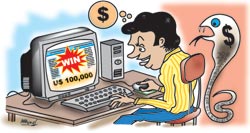
Don’t get tangled in a web of hoaxesYou have got a new e-mail address, you have given it to your friends and relatives, you start making contact with those you have lost contact for many years. E-mail seems so useful and easy to use, you wonder why you avoided the Internet for so many years. Then a good friend forwards you an interesting e-mail, you forward it to few others feeling happy to be networked. About a month goes by. You start getting e-mail from strangers. One says you have won a million US$ in an Internet Lottery. You wonder how since you never entered, but you get all excited. You reply, they ask you to open a bank account in a specified bank with an initial deposit $3000, to enable them to transfer you winnings to that account. You borrow money and open the account thinking you will soon be very rich and can pay back all your debts. Soon after, the funds disappear from the account you opened and you are left owing a lot of money to friends.
Computer literacy has not kept up with the rapid growth of e-mail usage in Sri Lanka. There are a number of basic facts about e-mail scams which those using it need to know. To summarize in a single sentence: If you get a great offer from an unknown person, ignore it, and if you are asked to forward the e-mail, to many contacts, don't. In another typical example, you are asked for help to transfer, giving you a generous commission, a large sum of money belonging to an important official, who has died in a war torn nation. Details are different but the bottom line is always the same. When contacted, they request you to send a significant amount of money in advance, or details of your Bank account, to enable the transfer. The outcome, if you are greedy and oblige, is again your loss. Scams like this are well known on the Internet, and feed on the rapidly increasing number of newcomers to the Internet. First mistake in this sad story is getting your new e-mail address to a list which was sold by those who collect e-mails for use to Spam or Scam. They often do that, by enabling the forwarded e-mail to send a copy to the originator, who collect the new e-mail addresses listed. If you forward any e-mail, a nice joke, image, or whatever don't contribute the e-mails of your friends to spam lists. Delete the header and use BCC (Blank Carbon Copy) option to hide the e-mail addresses of those to whom you send it to. A number of websites have opened to educate the public on these Internet financial scams. http://www.scamorama.com is one of the best. It archives many such scam e-mails for reference, as well as many actual e-mail correspondence with scammers. Some are sad stories contributed by those who got scammed, others of those who have had lots of fun scamming the scammers by pretending to be gullible. Nigeria is one of the most prolific sources of financial scams. It was nice to read a story, how someone got the scammer to go three times to the Lagos Airport to pick him up, before the Nigerian had realized, he had got scammed back. Whenever you are curious about a nonsensical e-mail, which ask you to forward, pick out a unique phrase from it and search for it on the web using http://google.com. Put the phrase between quotes to find an exact match. You will most probably find it archived on some websites like the few listed below which are dedicated to expose this kind of hoax. http://urbanlegends.about.com/ Another frequent type of hoax e-mail is computer virus related. It will warn you not to open an e-mail with a particular subject line. In general you should never open attachments sent by strangers. However, nearly all warnings which have been forwarded multiple times are hoaxes. See for example http://us.mcafee.com/virusInfo/default.asp?id=description&virus_k=98893 One health related e-mail claimed that water heated in microwave is bad to drink, and was illustrated with fake experimental pictures of plant growth. Properties of water heated in any way are the same and it does not depend on way it is heated. See http://www.snopes.com/science/microwave/plants.asp When anyone forwards me such an e-mail, I now search the web and reply to all, giving the URL which explains it is false, and ask the sender to forward the reply to the person who sent it originally. It is also interesting to do this kind of web search, using a key phrase without personal names, of jokes which pretend to be Lankan. You most often find that the same joke has been posted online, with just a change of personalities, for very many nationalities. For readers interested in more details an URL linked version of this article is available on the free online edition of Sunday Times at http://sundaytimes.lk (The writer has used e-mail since the inception of the Internet in 1983, and is a developer of a website on Lanka at http://lakdiva.org ) |
|| Front
Page | News | Editorial | Columns | Sports | Plus | Financial
Times | International | Mirror | TV
Times | Funday
Times || |
| |
Reproduction of articles permitted when used without any alterations to contents and the source. |
© Copyright
2007 Wijeya
Newspapers Ltd.Colombo. Sri Lanka. All Rights Reserved. |
